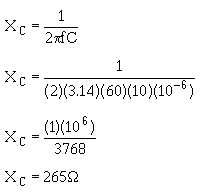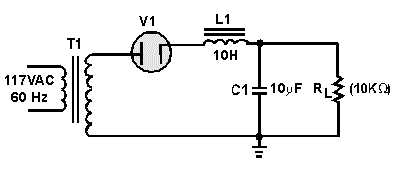3-27
Figure 3-32.—Half-wave rectifier with an LC choke-input filter.
This means that the capacitor (C1) offers 265 ohms of opposition to the ripple current. Note,
however, that the capacitor offers an infinite impedance to direct current. The inductive reactance of L1
is:
XL = 2!fL
XL = (2) (3.14) (60) (10)
XL = 3.8 Kilohms
This shows that L1 offers a relatively high opposition (3.8 kilohms) to the ripple in comparison to
the opposition offered by C1 (265 ohms). Thus, more ripple voltage will be dropped across L1 than across
C1. In addition, the impedance of C1 (265 ohms) is relatively low in respect to the resistance of the load
(10 kilohms). Therefore, more ripple current flows through C1 than the load. In other words, C1 shunts
most of the ac component around the load.
Let's go a step further and redraw the filter circuit so that you can see the voltage divider action.
(Refer to figure 3-33.) Remember, the 165 volts peak-to-peak 60 hertz provided by the rectifier consist of
both an ac and a dc component. The first discussion will be about the ac component. Looking at figure
3-33, you see that the capacitor (C1) offers the least opposition (265 ohms) to the ac component;
therefore, the greatest amount of ac will flow through C1. (The heavy line indicates current flow through
the capacitor.) Thus the capacitor bypasses, or shunts, most of the ac around the load.
By combining the XC of C1 and the resistance of RL into an equivalent circuit, you will have an
equivalent impedance of 265 ohms.




